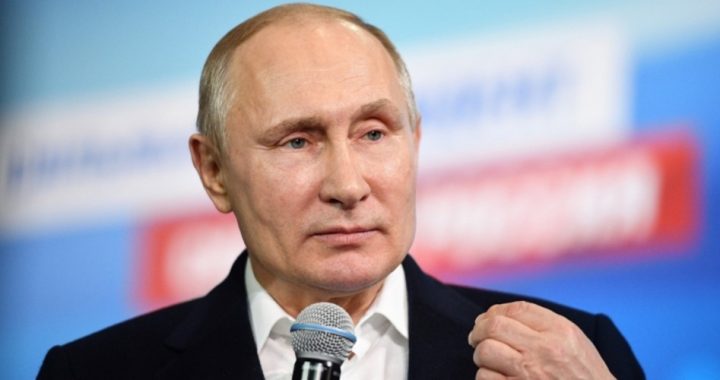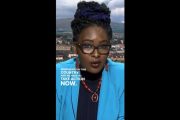
Putin’s presidency — an endless stretch to eternity.
Many people ask: “Why have elections in Russia, when the result is always the same? Why go through such a masquerade?” They don’t understand that authoritarian states need elections to “legitimize” their regime by a periodical display of national enthusiasm to keep the same people in power forever. On March 18 the world yawned again, looking at Vladimir Putin’s results in the polls. Yet again the Russian president, who has been in power for 18 years, enjoyed a landslide victory, grabbing 76.7 percent of the vote.
“It has become like a déjà vu that never ends for Russia. Every time there are elections, the winner is always the same,” says Elena Gorbuhina, a 34-year-old Moscow engineer. Indeed, a whole generation in Russia has grown up without knowing any other head of state outside of the figurehead Dmitry Medvedev, and without having a chance to compare Putin’s leadership to anyone else’s. Now he has been elected again for his fourth presidential term with an impressive 56 million votes cast for him and 67 percent voter turnout — a goal that the Russian administration wanted to achieve. And it did — relying not only on voters’ enthusiasm but on many tactics to control the vote.
Putin did not have any serious rivals. He would not have allowed anyone to jeopardize his position. Seven people were his “opponents” at the elections, but none of them came even close to challenging him. The real threat — Alexei Navalny — a lawyer and a prominent opponent of the Kremlin, who criticizes and exposes corruption among the ruling elite — was denied entry into the presidential race over an embezzlement conviction, which he claims was fabricated in order to harass him. Although Navalny — a pro-Western politician who wants to move Russia away from its totalitarian past — would not have had a chance to win, his widespread support, especially among younger, urbanized, and educated people, gave Putin’s regime serious reasons to worry. After his ban from entering the elections, Navalny urged people to boycott them. Many did. But it is very hard to fight Putin’s smooth election machine — always producing the same desired output.
Putin never appeared in a single presidential debate, and he never traveled around the country to meet with voters. He never participated in a spontaneous real-time Q&A with a critical reporter or media. He didn’t need to. His entire government machine, with its tremendous resources, was put into service for his reelection. Putin himself was never even in the spotlight; he even disappeared from the radar a few weeks before the vote and was absent for more than two weeks, without anyone knowing where he was. This may sound unbelievable to a U.S. voter, but this is how elections happen in an authoritarian captured state, which Russia has turned into under the endless rule of this former KGB agent.
Putin’s closest “rival” in these elections was Pavel Grudinin — the new leader of the Russian Communist Party — calling himself the good capitalist, who stands for turning privatized business into social enterprises. He received only 11 percent of the vote. The third-place contender was the ever-present fixture of the Russian political scene Vladimir Zhirinovsky of the Liberal Democratic country — a militant nationalist, with incessant military rhetoric and threats to annihilate the West. He received five percent of the vote.
Then came the most interesting candidate, Ksenia Sobchak, the 36-year-old media personality and socialite who is a staunch critic of Putin — pushing a liberal western agenda. She received only 1.7 percent of the vote, mostly from young, educated urbanites, who would have voted for Aleksei Navalny had he been allowed to run. None of these candidates was ever a threat to Putin. They were part of the elections merely to legitimize his win.
Putin has been in power since 1999 — either as president or as prime minister. Many consider the 65-year-old leader as the eternal ruler of the country, copying the governing style of his communist predecessors. After his first two consecutive four-year presidential terms ended in 2008, he switched places with the prime minister for four years, and it was during this time that he crafted a change to the country’s constitution to extend the presidential term to six years. In 2012, he again was elected president — for a six-year term. Now he has been reelected for another six years. Russians already joke that he’ll run his next term from Lenin’s Mausoleum (meaning that he will continue ruling after death).
But his rule is no joke: During his stay in power, Russia has endured a prolonged and slow strangulation of society through a series of repressive laws that limit social activism, political dissent, and independent media.
After massive protests against Putin that started in 2011, he became frightened. His permanent occupancy of the presidential office was questioned by the public. What immediately followed was a series of repressive laws against civic rights. These laws criminalized unauthorized protests with fines and prison terms. All of this was justified as a “fight against radicalism.” Putin initiated a huge crackdown on non-governmental organizations (NGOs) and has practically eradicated independent media. Internet freedom in Russia is also affected; the government may shut down websites that “violate Russia law.”
It is hard to fight a captured state, especially wherein Putin is presented as the nation’s savior. His campaign messages were simple and one-dimensional — they boiled down to: “Russia is the greatest country and those who mess with it will regret it.” Military rhetoric, nuclear weapons, patriotism, and blaming the enemy for any problems (with the West being the villain again) is pretty much what Putin’s “campaign” entailed. The national propaganda, praising him, has reached the point of hysteria, resembling the all-too-familiar personality cults during the days of Soviet communism. Even the children were not spared and were frequently used as a propaganda tool in this grim masquerade.
The only thing Putin was worried about in these elections was voter turnout. There were early indications that it would be quite a bit lower than in previous years. His administration came up with many tricks to rig the system: It introduced a system for people to vote at different voting sections from the one they have been registered at. With that, one person could vote multiple times at different polling stations. The government sent all Russian citizens with a mobile phone a message telling them they could vote at any polling station they wanted to. Navalny and his observers exposed this scam before the elections, showing how a person could obtain many “permits” to vote at as many stations he went to. The government, as usual, denied any violations.
Security cameras and observers caught multiple cases of ballot stuffing across the country. However, the majority of voting sections in the country lacked cameras and monitors, and so critics could only speculate on the size of the vote-rigging in Russia. Ironically, teachers usually administer the vote and commit the election violations. Russians mostly vote in school buildings, and the teachers are the ones who are in the voting commissions. Teachers are also used as agitators to propagate government’s message during election time. One instructor at a university in Crimea was caught on camera threatening students who do not vote with fines. This same teacher offered raffle rewards for those who voted. Putin won in Crimea with more than 90 percent of the vote. The peninsula was the showcase of Putin’s elections — Putin chose the election day to coincide with the date of Crimea’s annexation.
To boost voter turnout, election day was made to look like a national holiday in Russia: Free food and drinks were offered, free concerts were held, entertainers were hired to urge people to vote. No effort was spared to lure citizens to the election booths. And no effort was spared to harass Navalny’s supporters and stop their attempts to monitor and report on voting violations.
Despite Putin’s expected victory, he really cannot ignore millions of Russians who are angry with him — for failure to address corruption, for being part of Russia’s oligarchic model of governance, for its international isolation and growing military rhetoric. That’s why on many ballots Russians who went to vote wrote angry words and obscenities, saying words such as “Enough!” “Get out!” “Tired of you!” etc. “Young people are losing patience with this situation and are more vocal about their discontent with the Putin government,” says Igor Danilevsky, a professor at the Moscow Research University.
“Elections without choice are no elections” is the slogan of Putin’s critics. Some observers say that Russia today is a boiling pot under pressure that could unexpectedly explode. How soon (and whether) its society might attempt to loosen Putin’s grip remains to be seen.
Photo of Vladimir Putin: AP Images



